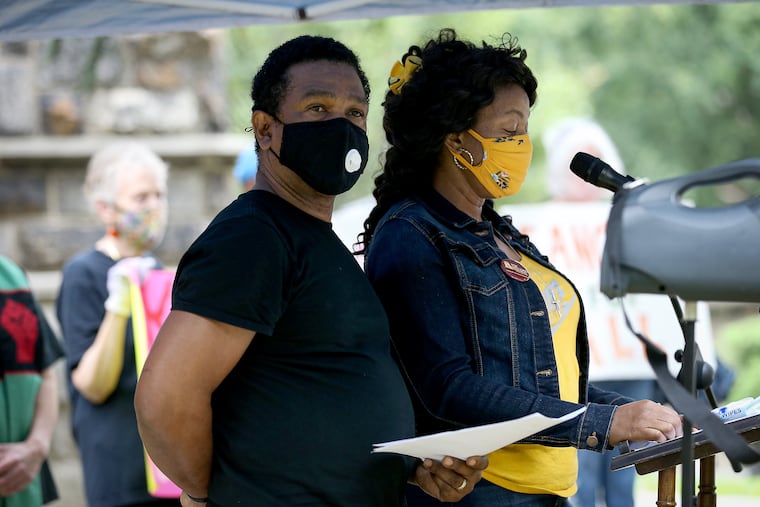After two years in Philly church sanctuary, an undocumented immigrant family departs — but not to freedom
The couple, who fled Jamaica in 2004, moved eight miles from a church in Germantown to one in University City, where they’ll continue their battle to stay in America.

After living two years inside a Philadelphia church to avoid deportation, Clive and Oneita Thompson have finally moved out — but not to freedom, nor back to their old life in South Jersey.
The undocumented Jamaican couple moved eight miles south to another church, where they will continue their battle to stay in the United States.
“It’s a long, hard fight, and we’re the ones that are in it. We have no choice,” said Oneita, who with her husband has been joined in sanctuary by their two American-citizen children. “Thank God somebody else decided, ‘I will help you guys, I will host you, I will pick up the torch to help you run this race.’”
Under a light rain on Tuesday morning, the Thompsons were formally welcomed into Tabernacle United Church in University City, an event that came only hours before the first presidential debate in a campaign where immigration stands as a key issue. About 30 people gathered outside in support, all wearing masks and many holding signs that read “Sanctuary for All” and “Freedom Now.”
“That’s our mission, to be a place of shelter for people, especially those who are under threat of harm in our world,” said the Rev. Katie Aikins, the church pastor.
The Tabernacle congregation’s sanctuary roots stretch back to the 1980s, Aikins said, and the church recently completed a two-year renovation project to install a shower and laundry in preparation for hosting an immigrant family if the need arose.
At the welcoming, supporters sang and chanted, and together broke sticks, placing half in a basket and taking half home, in what they said was a symbolic break from oppression.
“We’re offering them welcome, but the truth is, they shouldn’t be here,” Aikins said. “If the laws were just, they wouldn’t be here.... They would be at their own home, at work, in New Jersey.”
New Sanctuary Movement of Philadelphia, which supports the family, said in a news release that the Thompsons’ situation exposes the racism and anti-immigration bent of the nation’s justice system. It quoted Oneita: “As Black immigrants, we did everything right, but we still don’t get a chance. We are behind the walls of a church because we are Black."
Seven percent of non-citizens in the United States are Black, but they make up 20% of those facing deportation on criminal grounds, according to the Black Alliance for Just Immigration and RAICES Texas. In sheer numbers, Latinos are by far the most deported people.
The Thompsons fled their homeland in 2004 after gang members burned their farm and threatened to kill them. The U.S. government denied them asylum, yet allowed them to stay, hold jobs, pay taxes, buy a house, and raise seven children. That changed when the Trump administration put them on a fast track to deportation.
Since August 2018, the Thompsons had lived in the First United Methodist Church of Germantown, known as FUMCOG, taking sanctuary only days before they were scheduled to be removed to Jamaica.
Tuesday’s move came after the relationship between the family and the church became strained over time. “They made the decision that they could no longer be the host,” Oneita Thompson said.
The Rev. Bob Coombe of FUMCOG, who attended the event, said, “We did the best we could.... We did what we could over two years.”
Several other clergy members were present as well, showing that “as we shift congregations, we’re sending a very clear message that the faith community is behind them," said Peter Pedemonti, co-director of New Sanctuary Movement.
Churches are considered safe places for immigrants facing deportation, since ICE’s “sensitive location” guidelines generally bar agents from taking action in houses of worship, hospitals, and schools. Those in sanctuary can continue to fight their cases from inside.
In March, Honduran immigrant Suyapa Reyes, who took sanctuary with her four children in the same church at the same time as the Thompsons, won her freedom after 18 months, when the government reversed itself and said she could stay in this country.
Carmela Apolonio Hernandez and her four children are nearing three years inside the Germantown Mennonite Church sanctuary, having fled Mexico in August 2015 after being threatened by the drug criminals who killed her brother and two nephews.
For 14 years, the Thompsons lived peacefully in the Cumberland County community of Cedarville. Clive Thompson was a heavy-equipment operator at Bridgeton-based Cumberland Dairy, while Oneita, a certified nursing assistant, worked at Friends Village retirement home in Woodstown.
Son Clive Jr., known as C.J., is now at Columbia University, thanks to support from people who raised more than $29,000 to get him started at the Ivy League school.
Neither parent has been able to work since taking sanctuary. The pandemic put a stop to their fund-raising dinners.
Their younger citizen children, Christine and Timothy, moved into sanctuary to stay with their parents. The other children also live legally in the U.S.
“The thought of moving is hard,” said Oneita Thompson. “We’re already displaced from our home. We’re thinking we’re going to walk out of the church free, but that didn’t happen. To walk into the next church, it’s hard. … You still don’t know when it will end.”